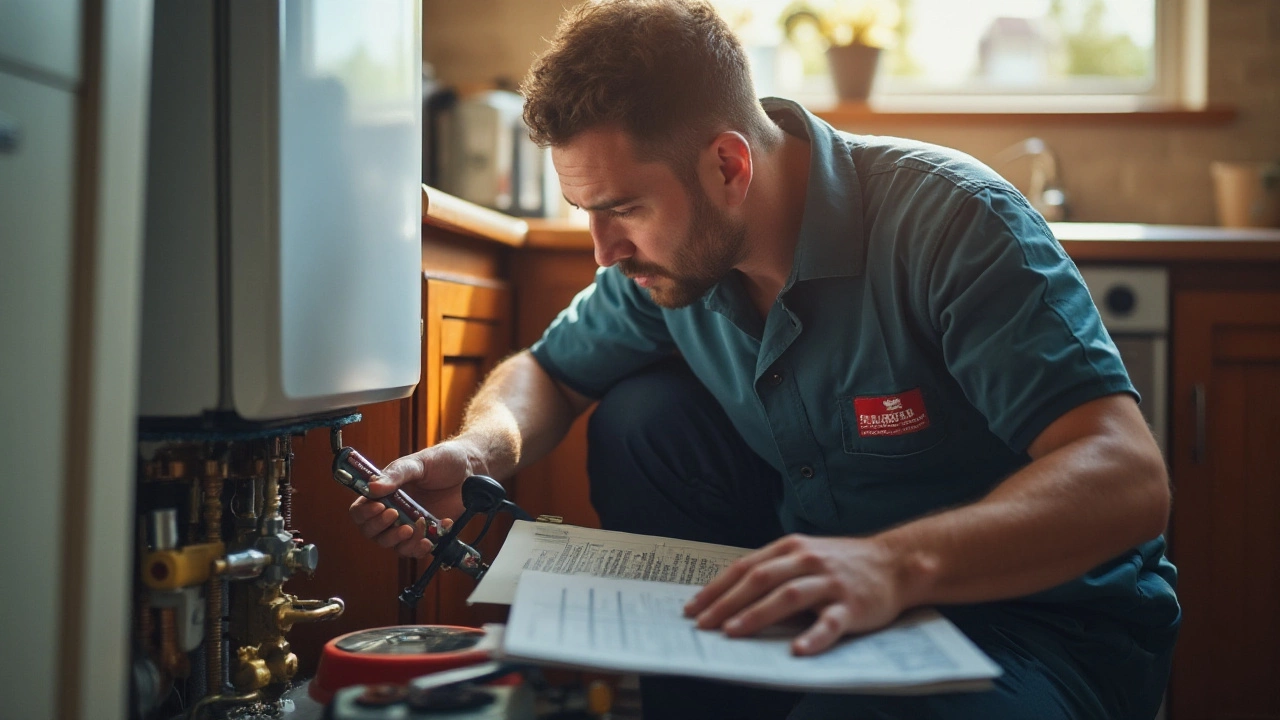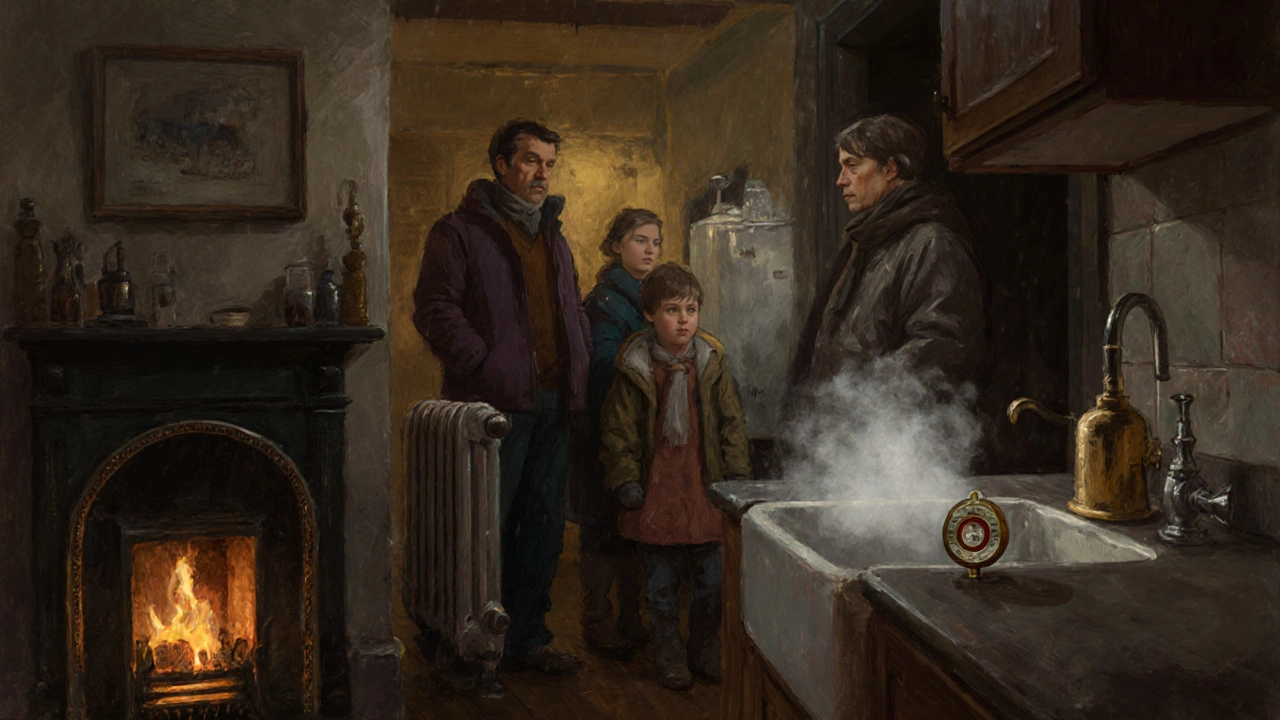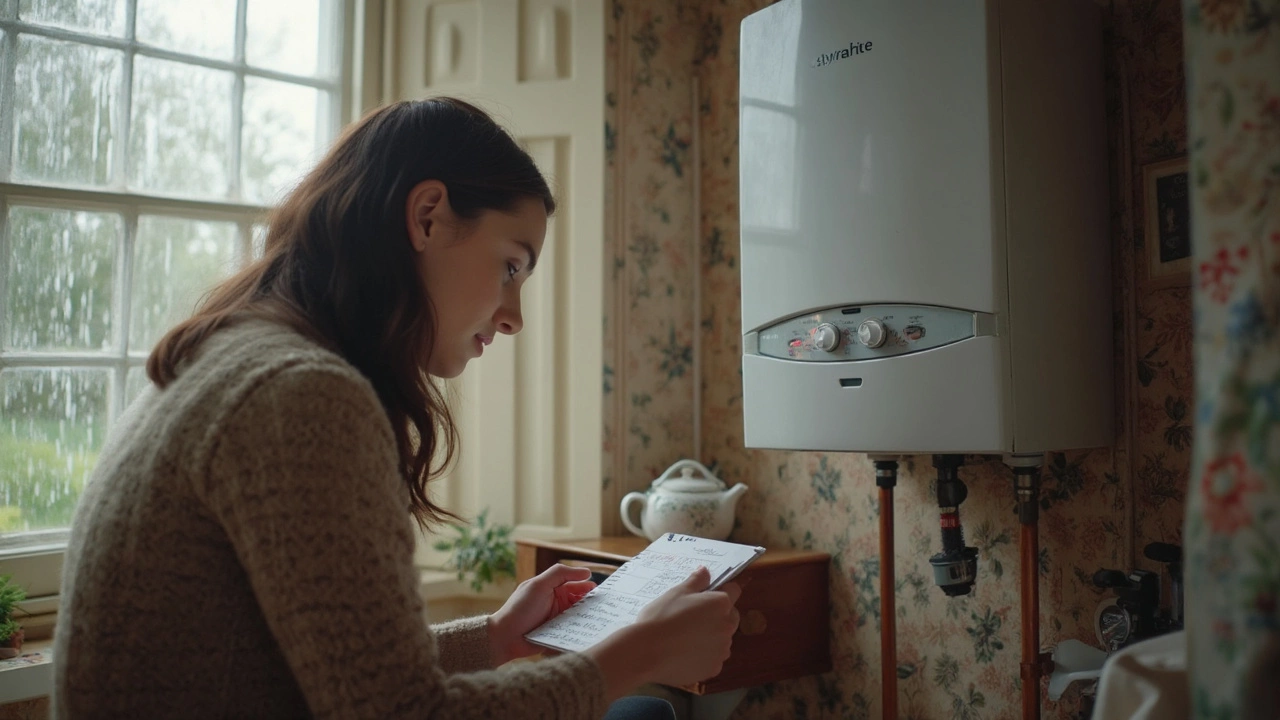Deciding whether to repair or replace your home's boiler is often a head-scratcher worth a moment of pause. With winter chills serving as a stark reminder of cozy comforts, understanding the nuances of heating system upkeep becomes essential.
Boilers are the silent workhorses of modern homes, ensuring warmth spreads evenly during those cold snaps. However, like any hardworking appliance, time and use wear on their efficiency. Knowing when it's time to give your boiler a quick fix or bid it farewell for a brand new model not only affects your comfort but also your wallet.
Before you make that call, it's wise to weigh several factors. From costs and potential savings to safety standards and lifespan, each consideration plays a role in your decision-making process. The thought of a major investment like a new boiler might daunt you, but equipped with the right information, you're more likely to make the best choice for your home and peace of mind.
- Understanding Boiler Issues
- Cost Analysis: Repair vs. Replacement
- Safety Concerns and Regulations
- Signs It Might Be Time to Replace
- Maintaining Your Boiler
Understanding Boiler Issues
When it comes to the intricate world of heating systems, recognizing common boiler issues is key to maintaining a warm, efficient home. A boiler operates tirelessly to provide heat by circulating hot water or steam through pipes to radiators, convectors, or other devices in every room. Over time, this system can face several hurdles that might require a boiler repair or, in more severe cases, replacement.
One common issue many homeowners face is the uneven distribution of heat. You might notice some rooms are noticeably colder even when the boiler is running. This could be due to trapped air in the radiators, which prevents water from flowing correctly, or potential blockages in the piping. Regular bleeding of radiators or cleaning the system can alleviate such problems but sometimes professional attention is necessary.
Strange noises emanating from the boiler can also signal trouble. Kettling, for instance, refers to the noise that resembles a kettle boiling, caused by limescale buildup in the heat exchanger. This sometimes happens when water flow is restricted, leading to overheating and pressure build-up, ultimately decreasing the boiler's efficiency and lifespan. Regular maintenance and descaling services can prevent such nuisances. Expert heating technicians often suggest, “Proactive maintenance not only extends the lifespan of your heating systems but also ensures optimal performance throughout the colder months.”
A leak in the boiler system is another red flag. Water leaks generally point to problems with internal components such as pressure valves or the pump seal. These issues demand prompt attention since water can cause substantial damage if left unchecked. Inflating energy bills without a significant change in usage might also hint at an underperforming boiler. This is typically a sign of an aging system struggling to maintain efficiency, and may suggest an imminent need for a new installation.
A persistent pilot light issue can also disrupt home heating. Older systems often have pilot lights that can go out due to issues like thermocouple faults, draughts, or a build-up of deposit. While reigniting a pilot light might seem like a simple fix, constant failures point towards the need for professional boiler maintenance or even part replacements. Misjudging these problems can lead to larger issues down the line.
Boilers are complex appliances, and like all machinery, they demand attention and care. Understanding these common problems and potential solutions is vital for anyone looking to prolong the life of their heating systems and keep their home comfortable. As much as we fancy bypassing the problem or postponing a repair to sidestep immediate costs, embracing preventive upkeep often saves time, money, and stress in the long haul.
Cost Analysis: Repair vs. Replacement
When faced with a malfunctioning boiler, the decision of whether to repair or replace it can haunt homeowners like the ominous hum of a late-night radiator. Boiler repair costs are often the first point of consideration. Repair bills can vary widely depending on the complexity of the problem, with minor fixes like replacing a valve line or pressure relief running relatively low compared to issues like a faulty heat exchanger, which might send costs spiraling upwards. It's not uncommon for repair costs to range anywhere between $150 to $1,000.
On the other hand, the price of replacing a boiler can hit the budget in a more substantial way. A new boiler, with installation, might cost between $3,500 to $8,000, depending on the size and type of boiler, as well as geographic location. Take into account these raw numbers, and the decision seems clear. But remember, the true cost extends beyond the check written to the technician. Use costs, energy efficiency, and peace of mind also play parts in this budgetary play. A new boiler traditionally offers superior heating systems performance and can be more energy efficient, thus gradually offsetting its initial sticker shock through reduced energy bills.
Many experts suggest considering the 'rule of $5,000' to simplify this complex decision. Multiply the age of your boiler by the estimated repair cost. If the result exceeds $5,000, it might be time to replace rather than repair. Professor Jenny Smith from National Home Maintenance Coalition once stated, "Treat each boiler not as a hindrance, but as a pivotal home investment, and weigh costs accordingly."
"A boiler is not just an appliance; it's a keystone of home serenity in winter months." - Professor Jenny SmithWith rising energy prices, prioritizing boiler maintenance alongside repair costs can also make longer-term financial sense.
Interestingly, there are proven cases where newer models can lead to savings of up to 30% on annual heating bills. Through advancements in heat conduction technology and smart integration, newer boilers optimize fuel usage, adapting more efficiently to fluctuating temperatures. Here’s a comparative glance:
| Boiler Age | Efficiency |
|---|---|
| 5 years | 80% |
| 10 years | 70% |

Safety Concerns and Regulations
When it comes to boiler repair, safety isn't just a checkbox—it's a fundamental component of keeping your home secure and ensuring your heating system runs smoothly. The concerns surrounding boilers are significant because they involve potential risks like carbon monoxide leaks, which, though rare, can pose severe health hazards. Ensuring safety means regularly inspecting parts and maintaining your boiler to prevent these unseen dangers.
In addition to personal safety, there are also legal and regulatory standards in place that homeowners need to be aware of. The UK’s Health and Safety Executive (HSE) mandates that any gas appliance, including boilers, must be installed and serviced by a Gas Safe registered engineer. Failing to adhere to these regulations not only puts your safety at risk but can also lead to hefty fines. These professionals follow stringent guidelines to ensure every aspect of the job meets safety standards.
Choosing between a repair and a replacement involves assessing the integrity of the existing system. On occasions, older boilers may not meet contemporary safety regulations, making repair a temporarily viable option but not necessarily a safe long-term solution. Many newer models feature advanced safety mechanisms that reduce risk factors significantly. For instance, modern boilers often include shut-off features that automatically cease operation if an error is detected, thereby protecting against malfunctions.
"Safety in boiler installation and maintenance isn’t just about compliance; it’s about peace of mind," says John Matthews, an industry expert. He adds, "Choosing the right solution for your home heating system requires an understanding of both the safety aspects and the potential risks involved."
Keeping in line with safety protocols also involves understanding the telltale signs of boiler trouble. Homeowners should be wary of unusual noises, such as bangs or clanks, which often indicate a pressure issue or other underlying problems. Regular maintenance is crucial and can help prevent more significant safety threats before they arise. Additionally, carbon monoxide detectors should always be installed in homes with gas appliances to provide an extra layer of safety. These small steps go a long way in safeguarding your home environment.
In cases where a repair can adequately address the issue, always ensure that the components used are officially sanctioned, meeting the safety standards laid out by regulatory bodies. However, there comes a point when replacing an inefficient or potentially hazardous boiler might be a more prudent decision. By doing so, it not only enhances safety but aligns with regulations and often improves the home heating's energy efficiency. Making informed decisions regarding boiler maintenance not only protects your property but also those who live in it, providing both safety and efficiency in the long run.
Signs It Might Be Time to Replace
Renovating your heating system can be a daunting task. It’s natural to put off changes when the existing equipment still holds up. Yet, certain signs clearly indicate a boiler replacement might be the prudent choice. First and foremost, if your boiler has aged beyond its typical lifespan of 15 years, it's signaling that time is nearing. Technology evolves quickly, and today's heating systems are far more efficient than their predecessors. This means by swapping out an old system, you could achieve substantial energy savings, effectively lowering your utility bills. Additionally, frequent breakdowns are more than just a nuisance; they’re costly. Repairing these systems over and over can surpass the cost of installing a new one. Homeowners often face frustration when dealing with recurring issues, hence opting for a more reliable solution becomes enticing.
Falling efficiency and rising energy bills often go hand-in-hand. If you notice a significant uptick in your heating expenses without a corresponding dip in temperatures, your boiler may be working overtime to meet your home’s needs. This inefficiency is a strong indicator that it’s straining beyond its capacity to function adequately. Inconsistent heating, where some rooms are warm while others remain chilly, also highlights a problem with the heating system distribution. The struggle to maintain a consistent temperature often points to wear within the system or outdated technology that simply doesn't suffice.
As John Carmichael, an experienced HVAC engineer once said, "A boiler is the heart of your home's warmth. When it falters consistently, it's like asking an athlete with a sprained ankle to run a marathon. Eventually, they'll need a restive intervention."
Another vital sign to heed is unusual noises emanating from the system. Technicians often refer to these sounds as 'kettling,' and they resemble a tea kettle whistle or banging noises. These noises typically indicate mineral buildup or overheating within the tank. Such conditions not only damage your boiler but also affect your home's safety. Ignoring these red flags can ultimately lead to a complete boiler breakdown which usually happens at the least convenient times possible.
Moreover, look out for visible leaks or corrosion around the unit. Leaks can cause water damage to your property and might impose thousands in home repairs. Corrosion is a clear signal of rust indicating the system's gradual decline. It is wiser to address these issues before they exacerbate into emergencies. Checking the boiler's flame can also offer insights. A healthy boiler displays a strong blue flame. However, if yours is burning yellow or orange, it's signaling incomplete combustion and potential carbon monoxide release, which is a serious health hazard.

Maintaining Your Boiler
Keeping your boiler in top condition is essential for both its efficiency and durability. A well-maintained boiler not only ensures that your home remains cozy during the cold months, but it can also save you on energy bills and even prevent unexpected breakdowns. Regular maintenance should start with an annual inspection by a certified technician. This is the best way to detect any emerging issues before they turn into costly repairs. During such an inspection, the professional will check important components like the heat exchanger, burner, and pump. They will also ensure that there are no leaks or blockages in the system, as these can significantly affect performance and safety.
For most homeowners, however, day-to-day maintenance can be effectively managed with a few simple steps. First, it’s crucial to keep an eye on your boiler’s pressure. Each boiler has a recommended pressure range, usually between 1.0 and 2.0 bar. Too low, and the boiler might fail to heat your home efficiently. Too high, and it could lead to system failure. Adjusting the pressure is typically a straightforward task but always refer to your boiler's manual or contact a professional if unsure. Regular bleeding of radiators is another important maintenance step. Trapped air within radiators can impede the flow of hot water, causing uneven heating. To bleed a radiator, make sure the system is off and cooled, use a radiator key to release any trapped air until water flows out steadily.
Moreover, keeping the heating systems area clear is surprisingly important. It might be tempting to store items around your boiler, especially if it's in a utility space, but clutter can obstruct ventilation and is a safety hazard. Some boiler issues might stem from a disrupted flow of air, which is vital for its operation. Similarly, ensure that vents and flues are not blocked by debris, leaves, or pests. Any obstruction can lead to dangerous gas build-up or inefficiency. For outdoor boilers, it might be worth considering a protective cover that still allows for proper ventilation. During harsher weather conditions, care should be taken to prevent frozen pipes. Insulating your boiler’s external pipes with lagging can effectively prevent freezing.
Routine care and inspections are your first line of defense against unexpected breakdowns, as advised by Energy.gov, emphasizing that regular maintenance can prevent up to 95% of all breakdowns.Beyond physical maintenance, listen to your boiler. Unusual noises, like banging or gurgling, can indicate underlying problems such as air in the system or low pressure. Addressing these sounds promptly can prevent more serious issues later on. Additionally, if your boiler supports a smart thermostat, consider using it to optimize heating schedules, which ensures not only comfort but also energy savings.
Finally, every few years, consider flushing the system to remove sludge and build-up. This involves cleaning the system’s pipes with a chemical flush or power flush to enhance efficiency and lifespan. Boilers under warranty usually require such maintenance as part of the conditions. Regular checks and maintenance, albeit might seem an interruption, play a crucial role in the longevity and performance of your home heating infrastructure. This attention to detail means you’re less likely to encounter surprises, ensuring that you and your family experience warmth without a hitch each winter.



